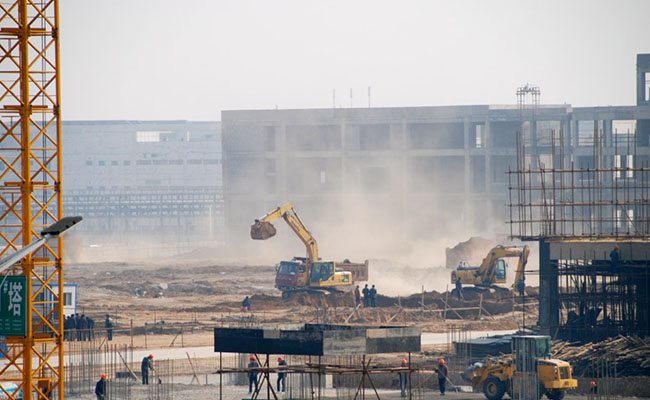Despite the fact that local governments avoid paying debts, banks do not have sufficiently powerful means to regulate debtors. It remains doubtful whether or not the central government will be able to repay the debts. Therefore, it is inappropriate to presume the safety of platform loans with the argument that “the government will assume joint liability of platform loans”.
With regard to the quality of local financing platform loans or “platform loans”, it is widely believed that although some local financing platforms may not be able to repay the principal and interest, they are very safe because local governments assume joint responsibility for the financing platforms controlled by them.
This is reasonable only if the current governments’ successor continues to support the enterprises. For example, every year a considerable number of listed companies become profitable only because of government grants which enable the company to preserve their shell companies. However, this view may not be well founded.
Let’s examine how. In April 2011, Yunnan Highway Development and Investment Co., Ltd. sent a letter to a creditor bank, stating that “from now on, only interest repayments will be made”. The financing platform had borrowed almost a hundred billion yuan from more than 10 banks, such as China Construction Bank, China Development Bank and Industrial and Commercial Bank of China. Later thanks to the Yunnan Provincial Government’s intervention, Yunnan Highway revoked the official letter, but the incident planted a seed of doubt in financial markets: how could the Yunnan Provincial Government support such a renegade company?
Another example of dubious handling of platform loan repayments came to light on June 25, 2012. A media leak of an internal discussion among major leaders of Hunan Province at the end of May stirred a hornet’s nest. They said, “In the case of construction of infrastructure [projects] involving specific investment and financing companies with an aggregate amount of RMB 7-8 billion, we should inform the relevant banks and individually notify and discuss the details of the project(s) with heads of each bank. These projects are unique cases of construction projects in our province and banks had promised to supply loans, but now refuse to do so. If the projects remain incomplete, the outstanding loans will not be repaid. We must now take action. It is time to seriously address the situation at hand.” From this example, it can be deduced that it is not incumbent upon local governments to assume joint liability of platform loans, and they may even threaten banks with refusal to repay the loans.
It seems that the relationship between local governments and financing platforms is very complicated. On the one hand, many local governments are supporting their financing platforms; on the other hand, they are often inclined to avoid paying debts. This leaves the safety of platform loans in an uncertain predicament. So what determines local governments’ attitudes and actions related to platform loans?
Local Government Logic
To answer the aforementioned question, we must first examine the incentive mechanism of local governments.
As GDP is currently the key performance indicator used to gauge the achievements of local officials, they take boosting economic development as their most important task. Meanwhile, local officials may serve a certain fixed term–for example, five years. Therefore, raising local GDP as soon as possible becomes the priority of their tenure.
The best method to accelerate economic development in the short term is investment, which requires attracting scarce funding. There is an incentive for officials to secure bank loans.
With bank loans it is possible to expand local investment, and the GDP growth brought by investment will improve local officials’ political achievements in the corresponding period. However, it often takes a long time to discover non-performing loans, especially in a situation whereby the loans are repaid with new loans and the deadline of repayment is extended.
When non-performing loans have to be disclosed, the officials who were originally responsible for the loans may have since left their posts. Therefore, local officials always hope to secure all funds that can be secured without consideration for the future repayment of loans.
From an economic perspective, this presents an obvious ethical risk. Non-performing loans may continue to appear if institutional restrictions are not imposed.

Cost of Avoidance of Paying Debts
The ethical risks brought by actions of local governments may give rise to non-performing loans. Can this problem be resolved under the current system? In my personal view, under the current system, there are three main incentives for local governments to repay loans: First, maintaining long-term cooperation with banks; second, pressure from government at higher levels; and third, pressure from public opinion.
The first incentive–the relationship between banks and local governments–is not simply commercial. Although state-owned commercial banks have significantly enhanced their controls over local branches, the actions of local governments towards local private banks still carry weight. Local governments may even take a series of measures to hinder the operation of the banks if they are discontent.
Moreover, many bank loans were supplied to local governments under the instruction of the Central Committee. For example, after the introduction of the RMB -trillion stimulus package in 2008, the Central Committee clearly encouraged banks to offer loans to financing platforms. The banks, which are subject to soft internal budget constraints, are hardly at risk of bankruptcy, and have a safety net to fall back on in the Central Government, even if problems do manifest. Given these conditions, it is speculated that banks are not fully encouraged to adhere to commercial principles when offering platform loans.
Platform loans may breed risks, but it takes many years for non-performing loans to become apparent. When non-performing loans are disclosed, the official initially responsible for the loans at both banks and local governments might have changed. Therefore, there actually is a short-term relationship between local officials and senior officers of banks.
In this case, it is doubtful that local governments would repay loans in the interest of maintaining the long-term relationship between banks and local governments.
The second incentive relates to veto powers of higher levels of government whereby China’s political system makes it possible for higher levels of government to influence lower levels of government. But this may be affected by at least three factors. Firstly, information asymmetry. Superiors must rely on the information provided by lower level officials, who may influence the decision-making of their superiors through providing selective information, or even distorting and fabricating information. A typical yet absurd example of this is the annual farce whereby the total GDP reported by the provinces is more than the independently calculated GDP of the country.
Secondly, in the same political system, inferior officers should obey the instructions of their supervisors. However, as the two ranks are inextricably linked to each other and their positions may be changed suddenly, it is hard for the higher ranks to adopt a strong approach to their subordinates regarding debt repayment.
Thirdly, the Chinese governments at both high and low levels are burdened with promoting the growth of the economy. Forcing governments at lower levels to repay debt may influence current investment and GDP growth, which will, in turn, affect the economic growth in the jurisdiction of the higher ranks. Moreover, superiors are held responsible for the rapid increase of local debts. If they had not pushed for economic growth and the central government hadn’t implemented the economic stimulus package, why would local governments have applied for so many loans from the banks? It is difficult for superiors to force governments at lower levels to repay debts.
It is also possible that the measures taken by superiors to force governments at lower levels to repay the debts may evoke a strong response but still produce no result as long as the government continues to prioritise economic growth.
The third incentive encouraging local governments to repay debt is that since 2009, public opinion has focused on platform loans in relation to the development of the internet, news and media and overseas and domestic bank listings. This reduces, to some extent, the prevalence of debt evasion by local governments. For example, as mentioned before, Yunnan Highway Development and Investment Co., Ltd. sent a letter which indicated the refusal to repay the principal of loans. When the media revealed this in June 2011, it triggered strong responses. But this restriction also has two defects: First, not all the information about platform loans is disclosed, and analysis and judgment on platform loans by outsiders relies heavily on the information provided by governments. Second, although pressure from public opinion makes the evasion of paying debts by local governments’ costlier, a systematic solution remains absent. Local governments avoid paying debts by deferring the payment. As the news cools off, outsiders have no mechanism with which they are able to monitor the government.
In summary, local governments should bear the cost of avoidance of paying debts. But such a cost is lower than that of general commercial loans. Local officials should distribute their resources to repay the debts or make investments. Investment is helpful for increasing local GDP and may reflect positively in the official’s political career. Therefore, local officials may use disposable funds to make investments first, instead of repaying debts.
As the economy grows, the rapid increase of local government revenue may alleviate the pressure to repay the platform loans. Thus, debt evasion would not result in severe immediate consequences. However, once the economy begins to slow, local governments may encounter a sharp drop in revenue growth and even negative growth. In this case, local governments may experience pressure even if they are only required to repay 20% of the RMB 9.1 trillion platform loans. Therefore, local governments may suddenly become more inclined to avoid paying debts.
In my opinion, the best way under the current system to stop local governments from avoiding payment of debts may be to prevent local governments from applying for large-scale loans, and encourage the central government to play a certain role. Unfortunately, the central government, which shoulders the objective of guaranteeing 8% GDP growth, may give the green light to the application for loans or even increase the loans offered when economic growth is obviously lagging.
When this coincides with the impulsive expansion of local governments and banks, economic overheating may occur in the short term and unveil massive non-performing loans.
Current Policy Limitations
The current balance of platform loans exceeds RMB 9 trillion. If in the future the projects funded by platform loans can generate huge profits, or local governments are able and willing to assume joint liability for platform loans, we need not worry about the health of these loans. But if the situation worsens, who should shoulder these responsibilities under the current policies and regulations?
It is a pity that nowadays the relevant policies fall far short of addressing concerns about the safety of platform loans.
On June 10, 2010, the central government issued the Notice of the State Council on Strengthening Management of Financing Platform Companies Established by Local Governments (Document No.19), This document is was issued by the authority that looks at platform loans at the highest level. It clearly proposed that “local governments shall bear limited liability for financing platform companies with their contribution so as to internalize the debt risks by the financing platform companies”. Moreover, this document also stressed that local governments shall not provide guarantees for financing platform companies.
On July 30, 2010, the Ministry of Finance, the National Development and Reform Commission (NDRC), People’s Bank of China and China Banking Regulatory Commission (CBRC) jointly released a document (Document No. 412) to interpret Document No.19. As we interpret Document No.19 with Document No. 412, we find that these policies have actually exempt local governments from the joint liability of platform loans.
For example, these documents stipulated that from June 10, 2010, with respect to the newly added debts of the financing platform company, local governments shall only assume limited liability based on the capital contribution amount. If the debtor cannot repay all the debts, creditors shall also assume the corresponding responsibility. Statistics from the CBRC show that the balances of platform loans at the end of June 2010 and the end of September 2011 were RMB 7.66 trillion and RMB 9.1 trillion respectively. Therefore, the newly added platform loans after June 10, 2010 were at least RMB 1.44 trillion. If 70% of them were offered to enterprises as legal person, local governments do not need to undertake joint liability for at least RMB 1 trillion platform loans. Moreover, the documents did not clearly state whether local governments shall bear joint liability for the remaining platform loans.
In addition, according to statistics of CBRC, 37.5% of the RMB 9.09 trillion balances of platform loans were guaranteed by local governments by the end of November 2010.
As the compliance of local guarantees has been denied by these documents, should we doubt whether the guarantees provided are valid? If they are invalid, the safety of platform loans will certainly be further weakened.
It is believed that the central government released these documents with an intention of regulating the actions of financing platforms and local governments. However, the huge balance of platform loans and plenty of guarantees provided by local governments may make it possible for local governments to avoid paying debts. Therefore, since 2010, CBRC has implemented a great number of policies on platform loans. For example, local governments are required to inject more resources into financing platforms. This has actually improved the cost to local governments of avoiding debt repayments.
The last question is that as local governments may avoid paying debts and their joint liability for platform loans has not been enshrined in policy, should the central government repay the platform loans?
In theory, the rapid inflation of platform loans is ascribed to the RMB 4-trillion stimulus package. The package was initiated by the central government. Financing platforms have promoted economic development, which helped the central government reach the goal of “ensuring growth”, so it is reasonable for the central government to bear some responsibility for platform loans.
On March 14, 2012, Premier Wen Jiabao talked about local debts at his last meeting with the media during his term of office. He said, “Loans for public welfare projects shall be repaid by governments, including the central government and local governments.” This is the first clear statement found which shows the central government may claim responsibility for the repayment of platform loans.
What are public welfare projects? What are the responsibilities of the central and local governments in repaying the loans?
It seems that governments have still not reached a consensus on addressing the issue of platform loans. Some local governments ask creditors to bear the liability, while some others say governments should be the responsible party. We have no way to tell which opinion will lead to a final resolution. Past experience shows that local governments do not have sufficient interest in repaying the debts, especially when the balance of platform loans is large and the economy encounters a downslide.
Moreover, even local governments avoid paying debts, banks do not have powerful means to restrict debtors and it remains to be seen whether the debts will be borne by the central government.
Therefore, it is considered inappropriate to stress the safety of platform loans by claiming that the government will assume joint liability of platform loans.
(Image courtesy Flickr user Bert van Dijk’s photostream)

















